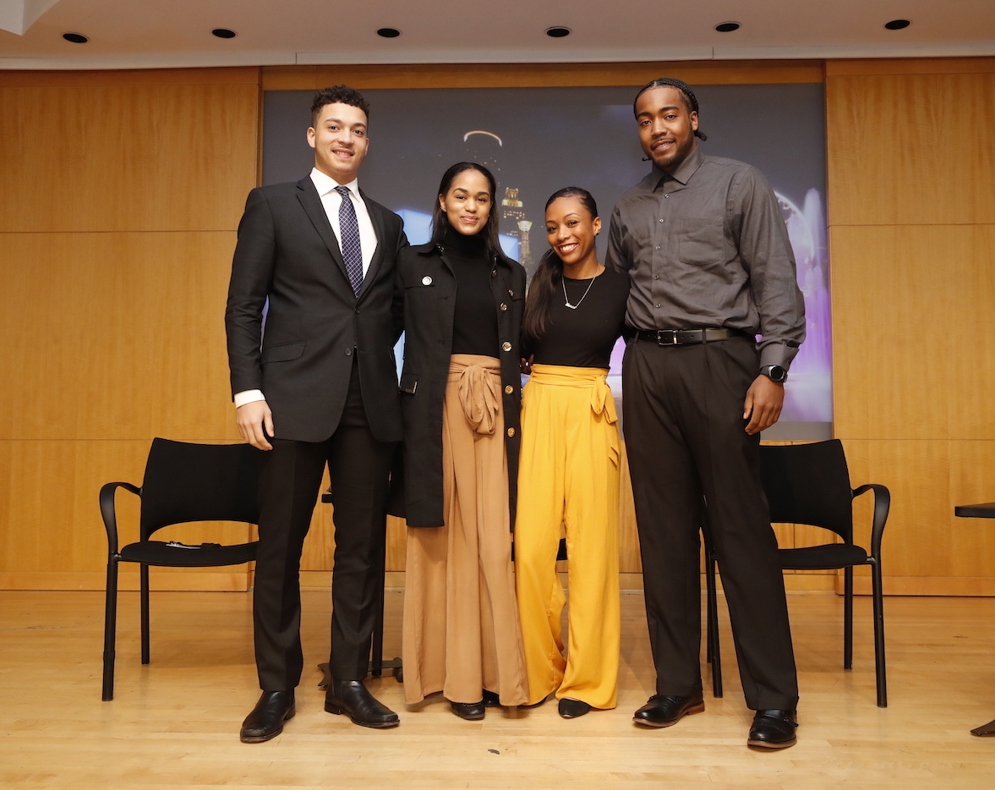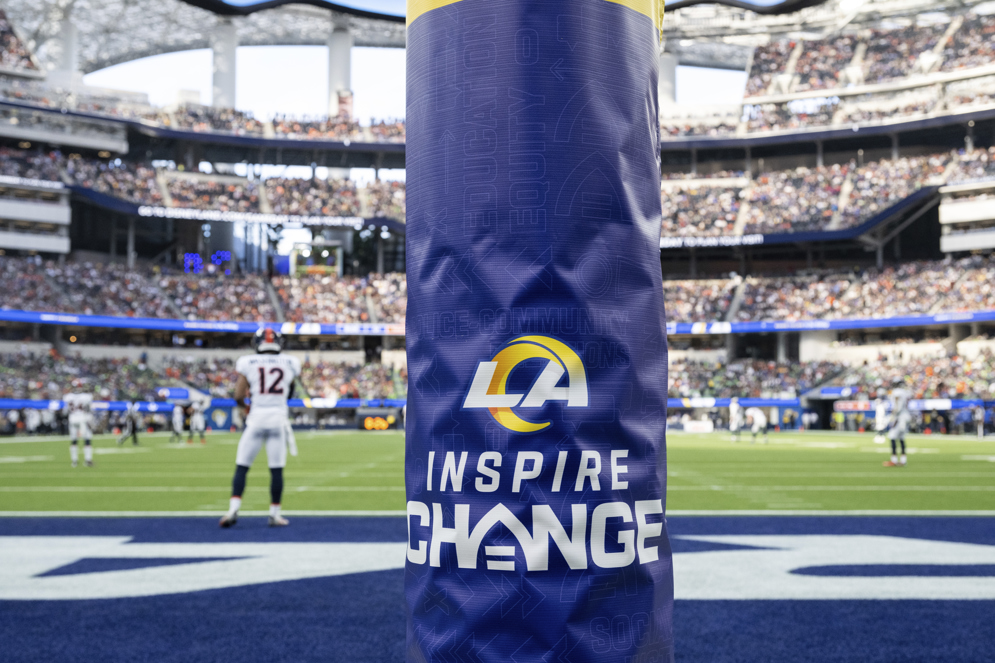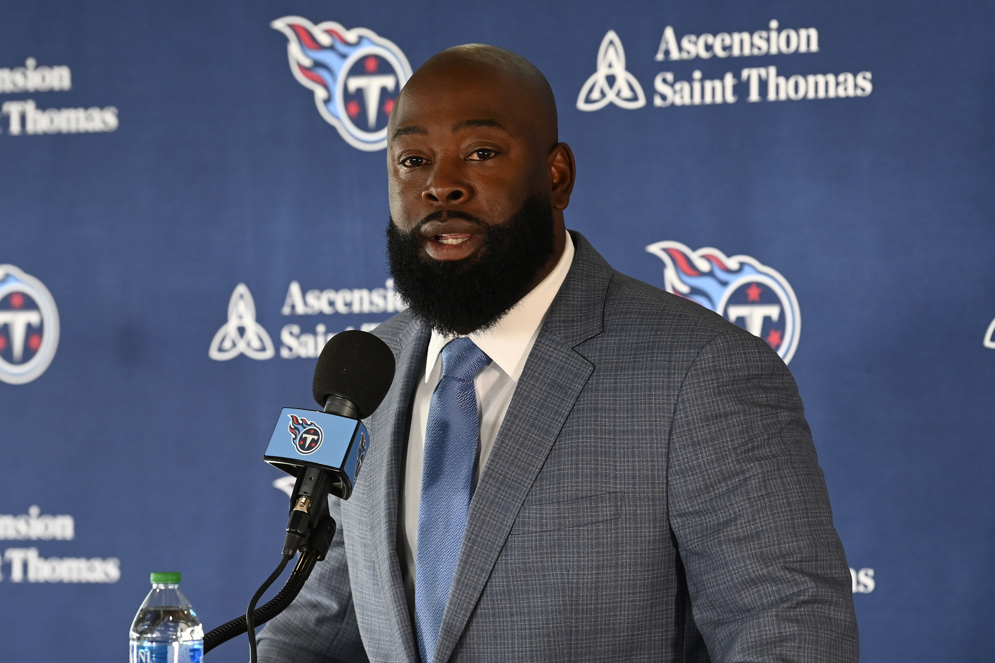It was at the site of the HBCU Week and college fair in Wilmington, Delaware, where the spotlight shines on our nation's excellent Historically Black Colleges and Universities each fall.
Youngsters were talking with HBCU admissions counselors. Students making professional connections. Successful businesspeople recruiting for interns.
Black excellence, all around me.
That was the backdrop when Ashley Christopher, CEO of the HBCU Week Foundation, made a bold statement: "We want this to be huge. As big as the Super Bowl." Experiencing what her organization had accomplished in its first years -- the generational impact it was beginning to make -- we were firmly aligned.
The NFL was in. We committed to partnering with the foundation, providing high school students with $10,000 scholarships to attend the HBCU of their choice. The latest round of applications just closed on February 15.
You may be asking, "Why is the NFL investing in HBCU scholarships that have nothing to do with football?"
It's because the National Football League, as a highly visible sports and entertainment entity, has a responsibility to the Black community.
Despite the work that still must be done to have more Black representation at the head coach level, the league does have a platform to effect change for players and others within the spectrum of competitive athletics.
But creating, curating and elevating opportunities for Black people broadly -- men and women from all walks of life -- is equally important.
We've ramped up those efforts over the past decade. In my opinion, the results my colleagues have worked so hard to achieve are second to none.
It's about degrees, jobs and pathways to a thriving wage
Since 2016, more than 4,000 students have participated in the NFL Football Operations department’s various partnership initiatives with HBCUs.
These include networking programs engaging hundreds of students and football executives annually; experienceships that give young people a chance to undertake assignments within NFL departments and build their resumes for life after college; a competition showcasing Black brainpower in underrepresented fields such as business and STEM; and the HBCU Week Foundation scholarship program, opening the door to enroll at these life-changing (and identity-affirming) institutions.
It's a long list, made possible by close to $3.5 million in donations and operational expenses to keep the HBCU initiatives running. The return is immeasurable.
Working-age Black people are also gaining access to skills that lead to career mobility through the NFL's nonprofit partners.

Per Scholas is one example. This national organization, founded in the South Bronx, provides tuition-free training "to individuals often excluded from tech careers." Unfortunately, despite a talent shortage, the tech sector only has a small slice of Black professionals in these roles, which pay well.
But because of initiatives like Per Scholas, that is changing. The NFL initially committed to enrolling 180 people in Per Scholas training. That number has jumped to 6,000-plus over the next two years.
We know this investment will make a difference for students and their families, for generations to come. More than 80% of graduates find full-time employment within a year of completing a Per Scholas program. The stats don't lie.
It's about uplifting Black-owned businesses
The league has put $125 million toward closing the wealth-equity gap in the past year. This money has supported Black-owned and -operated businesses such as Ariel Investments, CityFirst/Broadway Bank, Cover Communications and Fearless Technology.
Most recently, the league announced a partnership with Contract with Black America Institute (CBWA), expanding our commitment to economic equality.
The purpose? To create value for Black businesses and promote long-term economic growth for Black communities nationwide, which historically have been left behind as others have prospered.
It's about civic engagement
The act of voting is more challenging in predominantly Black communities. We see it every year for different reasons: the number of polling places, availability of ballot drop boxes, sometimes a lack of education on the process.
Every single one of our 32 member clubs supports NFL Votes, which focuses on voter education, registration and activation. Our clubs make their stadiums across the country, in every market, available for election-related activities. Many of these facilities serve as polling sites on Election Day.
Again, this project touches tens of thousands of Black people, because NFL Votes activities are literally happening close to home. Black voices are being heard more clearly as a result.
It's about social justice and ground-level impact
Then there's Inspire Change, the NFL's sweeping initiative to combat racial and social injustice with the independent Players Coalition.
Together, we pledged to provide $250 million in grants before 2027 — the money going to organizations focused on education, economic advancement, police and community relations, and criminal justice reform. Places like Per Scholas, which I wrote about earlier, that are doing good work on the ground.
We've already exceeded that goal. Several years ahead of schedule.
So we extended the Inspire Change partnership in January 2023. The NFL and the Players Coalition are going to build on the foundation of 650 local nonprofits and 40-plus national grant partners. This joint initiative, funding programs at organizations such as the Campaign for Black Male Achievement, will continue reducing barriers to opportunity and nudging America toward a more just place.
Look at this year's Super Bowl as an example. We used the energy and visibility of our biggest stage to raise awareness of the digital divide, and the fact that not all kids or communities have equal access to the resources they need to succeed. The Wednesday before the Super Bowl, NFL legends helped us donate computers to Arizona families in need -- an event hosted by the Inspire Change initiative in collaboration with three BIPOC organizations.

The next two days, Inspire Change and its partners brought attention to Café Momentum, a Dallas restaurant with an internship program for young people affected by the juvenile justice system. Café Momentum had a pop-up food truck at the Phoenix Convention Center, showing everyone in town for the Super Bowl -- including media -- that one small idea can lead to big strides like reducing recidivism and increasing high school graduation rates. We all have a part to play.
We talked to members of the Black community in Phoenix at the NFL Social Justice Town Hall. It was a deep, hard, at times vulnerable conversation. Among the things we heard: there are potential nonprofit partners that aren't on our radar, and they don't know how to apply for Inspire Change funding. Healing that disconnect is something we'll be looking at.
The Players Coalition also held a youth literacy assembly for students in the Las Vegas area during Pro Bowl week, and used Radio Row during Super Bowl week to amplify their message. NFL players, past and present, were involved in all of it.
It's not for me to take credit. The Commissioner's office, his leadership team and the player-led Players Coalition have worked tirelessly to elevate the Black community at all levels from education to professional development to social justice and fairness.
The overall impact of the Players Coalition has been tremendous. Anquan Boldin, Malcolm Jenkins and their brethren across the sports landscape have made measurable gains: winning nearly 30 policy battles, giving out more than $40 million in grants and leading a charge to help kids in underresourced schools connect to the internet.
These athletes continue to push us to do better.
Finally, it's about football inclusion
Here's where we blur the lines between the everyday Black community and those of us whose careers, identities and families are sustained by the great game of football.
Let me be clear: Representation matters. And there's not enough at head coach in the National Football League.
Black boys and girls need to see people who look like them in leadership positions across football to affirm their self-worth — to keep alive a sense of limitless possibilities.
Black professionals in football, from the front office to the sidelines, need the same to have confidence that they'll receive a fair shake for the next promotion. This point is crucial as we build upon HBCU partnerships and welcome more young Black professionals into league-affiliated workplaces.
The NFL is filling a pipeline of diverse coaching candidates at all levels, including head coach. We've launched programs from scratch to get the best candidates in front of club owners and other club decisionmakers at the table when personnel decisions are made. We're in a constant state of education and reeducation, doubling down on initiatives that prove effective and tweaking those that don't.

The same approach applies to executive hiring.
Ran Carthon, who is Black, had never met the Tennessee Titans' leadership group until December 2022, as a participant in the new NFL front-office Accelerator. He impressed; no surprise — Ran is an impressive person, the epitome of Black excellence.
One month later, the Titans hired Ran as their 14th general manager, the first ever Black person to hold that position within the Tennessee organization.
Making those connections, giving diverse candidates an opportunity to shine, is exactly what the Accelerator and other NFL pipeline programs are intended to do.
Ran's story is anecdotal evidence that we, as a football community, are on the right track. Looking at the numbers, we've seen progress at GM, club president and key roles in the coaching ranks. I'm hopeful these are indicators of better results to come and increased representation at head coach.
As we continue this important work, during the final days of Black History Month, it's worth reflecting on progress to date and the path ahead.
Black history is American history. Professional football is woven into the fabric, a thread still unspooling. Stitching in the Black agenda, committing to equity and access, will contribute to a richer tapestry. I truly believe it.
So long as we, the National Football League, focus our efforts on the big picture, we'll continue to make lasting change. No doubt these efforts are making a difference, today, this minute, to people in the Black community and other historically marginalized groups.
They are the reason we carry out the hard work of progress. Investing in opportunity-based initiatives will help build a more fair and just society. Meanwhile, building momentum toward true representation in football will show the world what's possible.
Troy Vincent Sr. is the executive vice president of football operations for the NFL.



